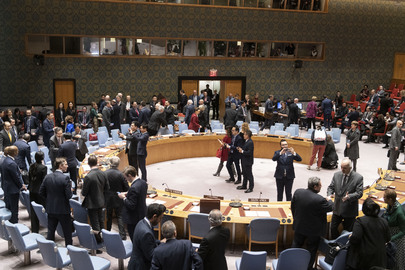Landmark treaty aims to protect countries against future pandemics
Countries have adopted the world’s first-ever international agreement to better prevent, prepare for, and respond to future pandemics.
The landmark decision was made in Geneva on Tuesday at the World Health Assembly, the annual meeting of UN health agency WHO.
The treaty marks a major step towards ensuring stronger global cooperation to protect lives and avoid the devastating consequences of future outbreaks.
It comes after more than three years of negotiations sparked by the COVID-19 pandemic, which killed some seven million people worldwide.
The crisis overwhelmed healthcare systems globally and devastated economies, with the impacts reverberating to this today.
UN life-saving aid allowed to trickle into Gaza as needs mount
UN humanitarians said on Tuesday that they have received permission from Israel for “around 100” more aid trucks to enter Gaza after only five were let in on Monday.
They warn that the scale of relief efforts allowed remains insufficient to meet the urgent needs of the population, which is facing famine conditions.
Since 2 March, Israel has blocked all shipments of basic humanitarian aid, including food and medical supplies, from entering Gaza. World leaders and humanitarian agencies have condemned a major new offensive and pressured Israel to lift the siege.
Israel cleared nine aid trucks on Monday to cross into Gaza but only five managed to enter, said Jens Laerke, spokesperson for the UN aid coordination office, OCHA.
Four trucks were unable to enter for logistical reasons, as shipments must pass through several levels of Israeli checks.
Here’s Mr. Laerke, speaking on Tuesday to journalists in Geneva:
“The five trucks that entered are still under Israeli control, and we need permission to pick it up. That did not happen yesterday. However, this morning we do have the permission to collect those five trucks.”
Meanwhile, UN agencies have stockpiles of aid ready and waiting to enter Gaza. For example, one warehouse in Amman, Jordan, contains enough food to feed 200,000 people for an entire month.
Mass returns push Afghanistan to the brink as aid declines
The international community must help people who have returned to Afghanistan to rebuild their lives, the UN refugee agency UNHCR said on Tuesday.
Over three million Afghans have returned home from neighbouring countries since 2023. It’s estimated that 780,000 have returned this year alone, including more than 350,000 deportees.
They have come back to a country that is clearly unprepared to receive them, said UNHCR Representative in Afghanistan Arafat Jamal.
Three-quarters of the population lives at subsistence level, while half of all Afghans need humanitarian assistance.
UNHCR has been providing cash grants to returnees, among other assistance, but funding cuts have forced the agency to slash this support.
“With the funding reductions, our current assistance package can be considered to be purely humanitarian. Absolutely vital. But short term and no- transformational. It can help someone to survive. But not to thrive.”
Mr. Arafat recalled that the international community has invested heavily in Afghanistan over the decades. He urged countries to stay the course and provide political and financial support so that returnees can build their futures.
Dianne Penn, UN News
And don’t forget you can hear more of our news and interviews by going to our website and audio hub.
Music composed and produced by Joachim Harris. All rights reserved.
Source of original article: United Nations (news.un.org). Photo credit: UN. The content of this article does not necessarily reflect the views or opinion of Global Diaspora News (www.globaldiasporanews.com).
To submit your press release: (https://www.globaldiasporanews.com/pr).
To advertise on Global Diaspora News: (www.globaldiasporanews.com/ads).
Sign up to Global Diaspora News newsletter (https://www.globaldiasporanews.com/newsletter/) to start receiving updates and opportunities directly in your email inbox for free.




























